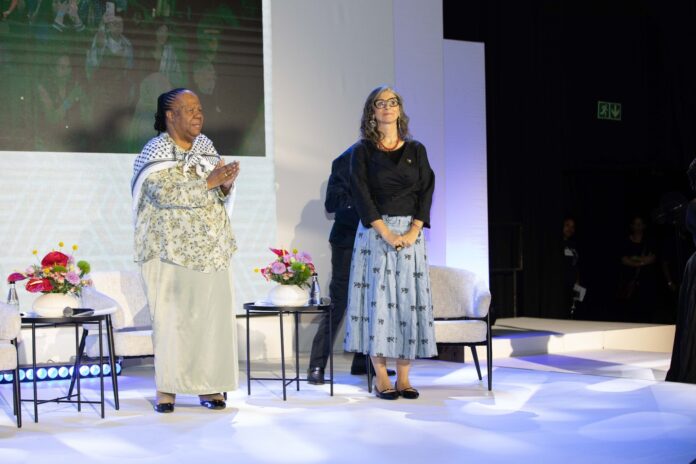The 23rd Nelson Mandela Annual Lecture was delivered by human rights lawyer and United Nations Special Rapporteur on the Occupied Palestinian Territories, Francesca Albanese, on Saturday, at the Sandton Convention Centre in Johannesburg.
The Lecture kicked off at 15h00.
Albanese, an international law expert, specialising in human rights and the Middle East opened by saying: “I am deeply honoured and humbled to stand here—on the soil that gave us Nelson Mandela and one of the greatest examples of liberation of modern history.
I thank the Nelson Mandela Foundation for keeping alive, not only the memory of a man, but the movement he embodied — the struggle for justice and human dignity … whose legacy we celebrate today.
I am deeply honoured by your invitation to South Africa to deliver this prestigious lecture, reflecting on how Mandela’s belief in the indivisibility of freedom, and his courage to confront power, can guide us through the cruellest injustice of our time.”
United Nations Special Rapporteur
The Nelson Mandela Foundation said that since May 2022, she has served as the United Nations Special Rapporteur on the situation of human rights in the Palestinian territory occupied since 1967.
She said in the Lecture: “After meeting so many of you in the struggle for justice for Palestine over the years — some of whom are in this room this afternoon — and after spending a few, yet profoundly intense and inspiring days among you, I feel it deeply: Mandela could not have been born anywhere else. He was — fully, truly, beautifully — South African. And there is so much of him in so many of you, that it cannot be a coincidence”
An affiliate scholar at the Institute for the Study of International Migration at Georgetown University, she is also the author of Palestinian Refugees in International Law (Oxford University Press, 2020), widely regarded as a landmark work on the subject.
She continued to say on Saturday: “In this moment, as the world witnesses the ongoing attempt to erase an entire people in Palestine: from the fleeting ceasefire in shattered Gaza to the accelerated colonization of the West Bank, history is pressing upon us.”
Scholarship
Albanese has taught and lectured at universities across Europe and the Middle East and has worked extensively within the United Nations system, including with the Office of the High Commissioner for Human Rights and the Relief and Works Agency for Palestine Refugees. She is also a co-founder of the Global Network on the Question of Palestine, a coalition of regional and international experts and scholars engaged in the issue of Israel/Palestine.
The 2025 Lecture addressed the theme “Enhancing Peace and Global Cooperation”.
This theme drew inspiration from a 2003 speech by Nelson Mandela in Malawi, where he reminded the world that “international and multilateral bodies have the ability, if there is the political will, to solve and prevent conflicts,” and affirmed that business leaders also share responsibility for building a more peaceful and prosperous world.
At a time of rising conflict, deepening inequality, and weakened multilateral institutions, the Lecture is a powerful reminder that peace and cooperation are not guaranteed—they are choices we must continue to make in an interconnected world.
Expertise and commitment to human dignity
“The Annual Lecture this year will enhance the Foundation’s commitment to fostering critical dialogue on justice, human rights, and peace,” said Mbongiseni Buthelezi, CEO of the Nelson Mandela Foundation. “Francesca’s expertise and commitment to human dignity make her a fitting voice for this year’s lecture, and the Nelson Mandela Foundation looks forward to hosting her.”
The indomitable spirit of the South African people — who overcame centuries of European colonialism dismantling the criminal system of apartheid — continues to resonate far beyond these shores, inspiring all who still dare to believe in the possibility of justice.
The Lecture took place in partnership with University of the Witwatersrand for the second consecutive year, reflecting a shared commitment to advancing knowledge, dialogue, and social justice.



